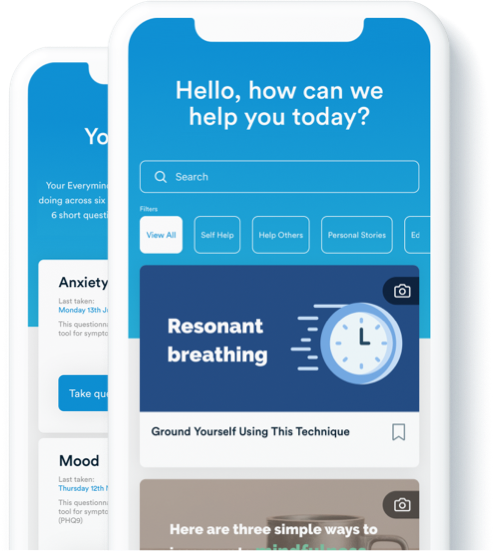Obtain the most appropriate Workplace Mental Health Programs Schemes for your needs with our constructive journal entry.A range of public services are provided for people with mental health problems that could potentially support participation in employment but there are significant challenges with provision for this purpose. How engaged a workforce feels, and how well it is communicated with, are critical factors in an organisations’ performance. Engaged employees are good for business as research repeatedly demonstrates a positive link between levels of engagement, and performance, productivity, staff innovation, customer service, staff advocacy, and absenteeism. We often spend more of our waking hours at work than we do at home. Just because work is a different environment doesn’t mean we become different people, and some of the biggest stresses in our day to day life can originate at work. Colleagues might be challenging, deadlines tight, the commute long, or maybe the job is unrewarding but financially imperative. Praising employees who work late and arrive early, or expecting them to work from home in the evenings hurts your company in the long run. Without a healthy work/life balance, productivity is likely to decline, and employees are more likely to burn out. When you ask someone about their health, isn’t it true that you’re thinking just about their physical health? Is being physically healthy enough to classify yourself as healthy? The current difficult financial climate has the potential to increase mental health problems in employees because of worries about job insecurity and unemployment. Measures to safeguard employee mental wellbeing could help businesses and organisations retain staff with the skills and experience necessary for sustaining business performance in the long tem.

While the stigma around workplace mental health has reduced in recent years, the support on offer to workers across the mental health spectrum is typically limited. There is often a “one-size-fits-all” approach that fails to cater to the individual needs of every employee, and only focuses on mental wellness once a problem has already occurred, meaning only the past is ever dealt with. Instead, an approach which focuses on the past, present and future will help to prevent issues developing. Managing an employee with mental ill health may not always be easy. At times you may feel overwhelmed and experience feelings of resentment, frustration, anger, guilt, worry or fear. These reactions are normal. When cancers are caused by people’s work, they are called occupational cancers. Occupational cancers can be caused by many things, and affect many workers, but despite this they have often been overlooked. As a result, occupational cancer is sometimes referred to as a ‘forgotten epidemic’. Promoting wellbeing and tackling the causes of mental health problems will create an environment where staff can feel confident to talk to their manager. Discussing ideas such as
workplace wellbeing support is good for the staff and the organisation as a whole.
Offering A Tailored ApproachMental health issues run the gamut, from anxiety and depression to eating disorders and post-traumatic stress disorder. They can affect a person’s perceptions, thoughts, moods, and behaviors. The barriers that prevent people with mental health conditions from finding and keeping paid work include low expectations of people’s own ability to cope with work, reflecting low expectations in society in general of the abilities of people with mental health conditions (self-stigmatisation). There are various reasons why employees don’t speak up - from not knowing the process for airing problems to feeling ashamed. There are many things managers and employers can do to create a speak-up culture, where those struggling with mental health will feel comfortable asking for help. Mental wellbeing at work is determined by the interaction between the working environment, the nature of the work and the individual. In a lot of countries, the stigma associated with mental health is very high. Having a psychiatric disorder is frowned upon and sometimes even laughed at. But you can change this by talking about it. You can conduct mental health awareness programs. You can give presentations, share your personal experiences (if any). Communication that emphasizes that leadership cares about concepts such as
how to manage an employee with anxiety should be welcomed in the working environment.
If you think an employee is considering suicide, it is important to tell him/her that you care and that you want to help. Encourage them to talk - the opportunity to talk about how they feel and why they want to die often provides great relief. Asking or talking about suicide does not cause someone to become suicidal. Larger employers can and should demonstrate accountability by nominating a health and wellbeing lead at Board or Senior Leadership level, with clear reporting duties and responsibilities. The best employers take a proactive approach to their employee’s wellbeing. They understand one simple truth. A happier workforce is a more productive, enthusiastic and loyal workforce. Prior to implementing new mental health supports, a needs assessment should be conducted to understand employees’ needs and support gaps. Employers should also develop their mental health strategy or new supports in consultation with employees – to ensure they are relevant and accessible. Where possible, businesses should offer a variety of supports so employees can choose which option(s) works best for them and their families. Mental health is the way we think and feel and our ability to deal with ups and downs. Don't forget to send out proper internal communications around
workplace wellbeing ideas in your organisation.
Poor Decision-makingEmployee assistance programs that use counseling and multi-component interventions can be effective at reducing absenteeism, presenteeism, well-being and workplace functioning. The effectiveness of EAPs can vary depending on the current mental health status of the employee, level of investment by employers and usage rates by employees. Employers should consider the advantages and disadvantages of different EAP formats and decide which would be the best fit for them. Businesses looking to better support their staff must embrace a more nuanced approach to mental health that covers all challenges. The types of support offered should be numerous, ranging from therapy and counselling, through to other services such as psychology, life coaching, careers guidance and meditation. In addition to talking about poor mental health, we need to talk more openly about what we can do to nurture our mental health, open up conversations about what it means to experience a positive state of mental well-being, and look after our mental health. Although it may seem tempting to eat your lunch while also catching up on some emails, it is important to step away from your work and take some time for yourself mid day. Taking a lunch break every day can help improve your mood, wellbeing and even lead to higher engagement at work. The focus on the importance of employee mental wellbeing has increased in recent years. Attitudes are shifting as the stigma that used to be associated with it is slowly but surely being removed, and more opportunities are being taken to bring the issue out into the open. Organisations can make sure their employee benefits package provides support for
employers duty of care mental health today.
Mental health can affect worker safety. Even if no actual illness is diagnosed, it’s easy to imagine how a worker’s mental state might affect his or her ability to make good decisions and recognize potential hazards. When working to set the tone of mental health being safe to discuss in a team, you must think about one core thing: trust. Trust is everything. Without trust, you can’t build anything else. Often the toughest task for managers is helping their employees to adapt and respond positively to change. This includes constructively working with people’s resistance to change, which is a normal part of the change process. Performing a task for the enjoyment of it is intrinsic motivation. A strategy that employs intrinsic motivation helps employees tap into their personal interests and goals help to create a happy, productive, and engaged workforce. A manager who believes a team member may be experiencing mental ill health should take the lead and arrange a meeting as soon as possible to talk to the team member in private. The conversation should be approached in a positive and supportive way. For employers not investing in wellbeing initiatives,
managing employees with mental health issues can be a difficult notion to comprehend.
Psychological & Social SupportCreating a culture of recognition and trust in the company is essential for professional communication and cooperation. In turn, this plays an important protective role in promoting and maintaining the employees‘ mental health. Organisations should develop a broad Mental Health Plan with input from all stakeholders, provide adequate resources to support plan implementation and consistently model positive mental health behaviors and enforce plan policies. Workers absent due to mental ill health are seven times more likely to have further absence than those with physical health-related sick leave. Looking after your team’s mental health is just as important as their physical health. This will lead to a more productive team in the long term. You can discover further details appertaining to Workplace Mental Health Programs Schemes on this
Health and Safety Executive web page.
Related Articles:









